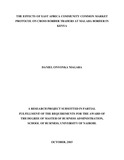| dc.description.abstract | Transactions of commercial nature across national borders of at least two countries have taken a
center stage in the business world. Nations require innovation and continuous technological
advancement to cope with challenges of competition due to globalization. The implementation of
EAC Common market protocol and the difference in levels of economic development has led to
relative difference in price of goods and service, availability and movement of factors of
production, change of demand of goods and service, and effect of differential applications of tax
administration procedure and level of development are the factors which affect business climate
index. The objective of this study was to assess the Effect of East Africa Community Common
market protocol on Malaba cross border traders in Kenya. It adopted a cross sectional design in
form of a survey which focused on Malaba Border in Kenya side involving a small number of
respondent. The study targeted a population of 34 Customs department officers, 26 customs
brokers and 100 small scale traders. From these, a sample of 32 respondents was selected and
issued with questionnaires which were the data collection tools used. A response rate of 94% was
achieved. The data collected was analyzed through the use of SPSS software and results
presented in table and figure form where appropriate. The study findings revealed that
implementation of the EAC common market protocol has greatly affected the business
operations on cross border traders at Malaba Border in Kenya for majority of traders directly or
indirectly involved in processing and clearance of goods. First ,implementation has drastically
reduced the time to obtain construction permit and opening of business across the border .
Secondly, The concept of SCT has not only greatly improved the delivery time of the cargo
to destination but also greatly reduced the dumping of consignment of trade goods on
transfer to other partner state. Further the benefit of tax harmonization procedure and
elimination of Nontariff barriers had not been fully achieved which the majority of the
traders perceived not only as the source of unfair competition on cross border trade but also an
element which reduce the demand for intra trade. Most of the small scale business operators
were unaware of the implementation process and the existing and unexploited opportunity of
wholesale trading and existing market share in Uganda side. The study therefore recommends the
need for Malaba Traders to be sensitized to create awareness so as to exploit the opportunities
which come along with the implementation of the EACM protocol. There is also need for
Political will and commitment towards successful implementation of investment reforms
programs directed towards infrastructure, health, Education so improve the living standards
reduce poverty level and make Malaba border competitive location for investments. | en_US |

